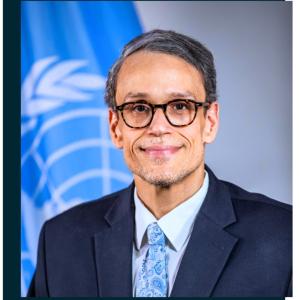- Vice - Chair Jainaba Johm, Commissioners and staff of the National Human Rights Commission.
- Priscilla Yagu Ciesay, Founder and all staff of the Women’s Association for Women and Victims’ Empowerment.
- National Assembly Members.
- Government representatives.
- All partners including Civil society organisations, International organisations and the media.
- UN Colleagues
All protocols observed.
Esteemed guests,
I am deeply honoured to join you on this occasion as we commemorate the International Day in Support of Victims of Torture.
Torture is a grave violation of international human rights law.
It is prohibited under all circumstances as enshrined in the Convention Against Torture and Other Cruel, Inhuman or Degrading Treatment or Punishment (CAT).
The Gambia’s ratification of this Convention and domestication through the Torture Act are pivotal moments in the journey towards justice, accountability, and the rule of law.
These developments, alongside the work of the TRRC, mark critical steps in The Gambia’s transitional justice process that seeks to reckon with the past and lay the foundation for sustainable peace and non-recurrence.
Yet, legal reform alone is not sufficient.
The effective prevention of torture requires robust, independent monitoring mechanisms, sustained political will, and the meaningful and inclusive participation of civil society and victims' groups.
The prevention of torture is also deeply interlinked with the achievement of the SDGs, particularly Goal 16, which calls for the promotion of peaceful and inclusive societies, access to justice for all, and the building of effective, accountable institutions.
Ensuring justice for victims of torture and guaranteeing non-recurrence is a prerequisite for reconciliation and the consolidation of peace.
Ladies and Gentlemen,
I acknowledge The Gambia’s efforts towards eradicating all forms of Torture and strongly encourage the ratification of the Optional Protocol to the Convention Against Torture (OPCAT), as a powerful demonstration of continued commitment to transparency and accountability.
I also recognize the National Human Rights Commission (NHRC), whose independent mandate is vital to promoting accountability, monitoring compliance, and strengthening national human rights protection systems.
I extend my heartfelt appreciation to and commend the Women’s Association for Victims’ Empowerment (WAVE) for convening the 3rd Annual Human Rights Festival, an important platform that speaks against Torture, centers the voices of victims and places human rights at the heart of national dialogue.
This Festival is a powerful reminder of the resilience of victims and the strength of communities that rise in solidarity to demand truth, justice, and reform.
The United Nations remains a steadfast partner to The Gambia in its human rights journey.
We reaffirm our commitment to supporting the full implementation of the TRRC recommendations, the strengthening of national institutions, and the protection and enjoyment of human rights for all.
In closing, let us reaffirm our collective resolve to eliminate torture in all its forms and to ensure justice, reparations, and dignity for all survivors.
Let us work together to build a Gambia that is inclusive, rights-respecting, and free from the legacies of abuse.
With these words, I am pleased to declare the Commemoration of the International Day in Support of Victims of Torture officially open.
Thank you.






